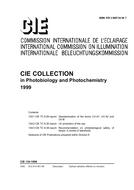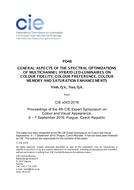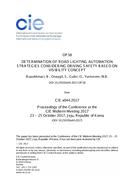Click here to purchase
This report surveys cognitive aspects of colour in terms of behavioural, neuropsychological, and neurophysiological data. Colour is usually defined as a colour stimulus or as perceived colour. In this report the concept of cognitive colour has been discussed in relation to colour categorization, colour coding, colour naming, the Stroop effect, spatial organization of coloured visual objects, visual search, and colour memory.
The results show that there are aspects of colour that the CIE definitions of psychophysical and perceived colour do not cover, although it gives notes to some of them. These phenomena could be referred to as “cognitive colour” and they point to the need for a new formal definition of colour in the CIE terminology.
Cognitive colour is very important in certain specific tasks. A common property of these tasks is the importance of the economy of cognition of the human brain. It means that perceived colours are represented and stored in a compressed form i.e. as “cognitive colours”. This accelerates complex tasks like visual attention, visual search, figural organization, figural segregation, etc. For these tasks, colour appearance models alone, including the calculations recommended for assessing colour appearance and colour differences, may be limited for predicting how an observer will behave in these complex tasks. We must define cognitive colours by the boundaries of a continuous perceived colour set, or by a “representative item” of this set, and assign a name to the cognitive colour.
The final report from the CIE Reportership “Cognitive Aspects of Colour” was published with the title “Cognitive Color” in Color Research and Application, 29(1), pp. 7-19, 2004 and has been reprinted with the kind permission of John Wiley and Sons, Inc.
The report is written in English, with a summary in French and German. It consists of 24 pages with 14 coloured figures.
Product Details
- Published:
- 01/01/2005
- ISBN(s):
- 9783901906404
- File Size:
- 1 file , 1.6 MB


